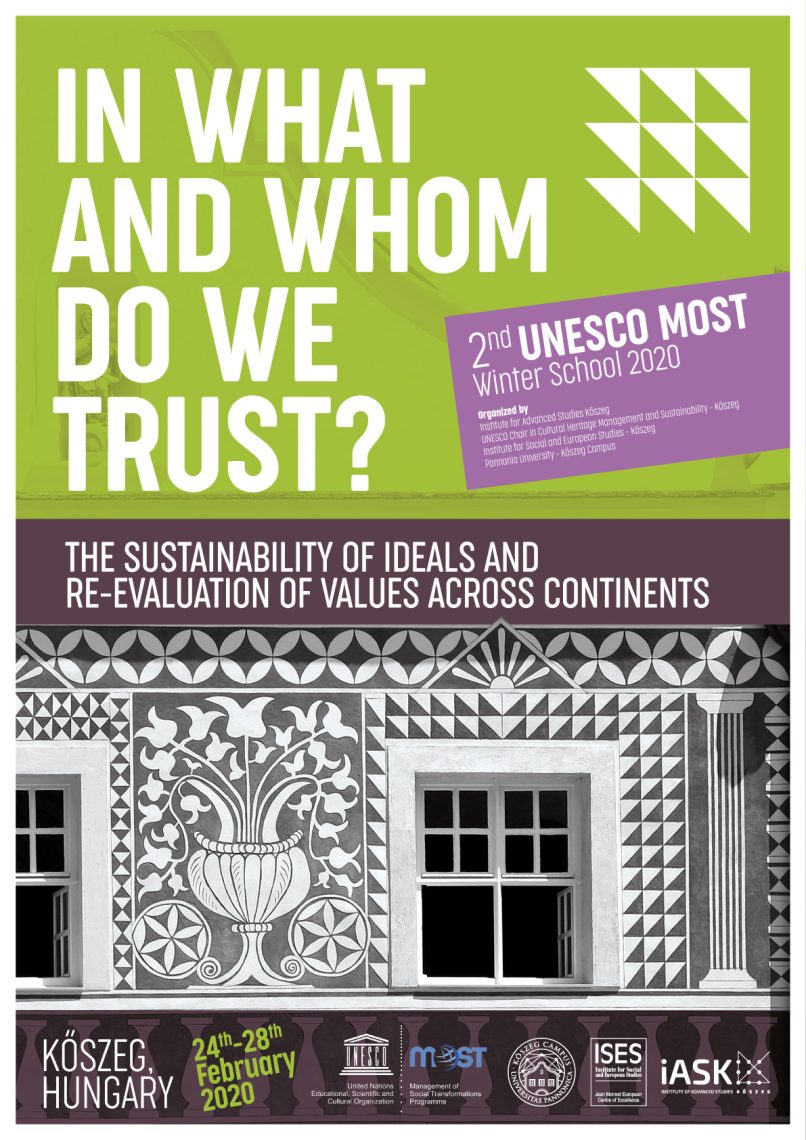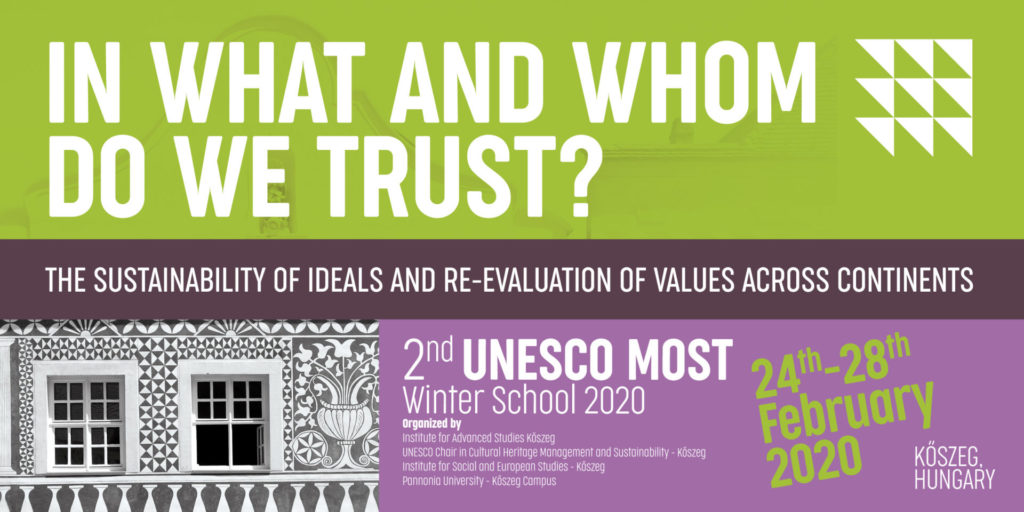Research & Studies


Global complexity accelerates global transformations, and the tension between rapid changes and established beliefs shakes citizens’ trust in institutions. A main issue of the UNESCO MOST Winter School is to address whether supra-national entities and global caretaker institutions or national political solutions are better able to address global challenges.
We will discuss questions like: Why are we seeing the rise of post-liberal regimes? What impact does this have on institutional trust at the local, national, and supranational levels? Is this merely a temporary global ‘glitch’ that will fade over time as new challenges emerge?
Discussions are lead by experienced academic researchers, activists and public officials to open dialogue on the issues of how to establish or re-establish trust on different levels of governance, i.e., in politics, economies, and societies. Participants will produce a document with recommendations for local governments, ministries, and the media. Important questions addressed in this document will include:
UNESCO MOST Schools are constructed around capacity-building activities focused on strengthening competencies for evidence-informed decision-making. They help develop participants to translate knowledge into action. A primary goal is to support long-term sustainable development in contexts where capacity gaps constrain translating research into action. MOST School participants come from varied educational and professional backgrounds. We invite post-graduate students, researchers, policy makers, and young professionals with keen interest in the topics to actively participate.
The University of Pannonia can offer 5 ECTS after full participation in the course.
Monday, February 24
Arrivals
17:30 Opening and Welcome: Béla Básthy – Mayor of Kőszeg
18:00 Reception
Tuesday, February 25
9:00 – 10:00 Registration
10:00 – 12:00 Theoretical and Global Perspectives
H. E. Mladen Andrlic, Ambassador, Republic of Croatia
Gábor Soós -Secretary-General of the Hungarian National Commission for UNESCO
Keynote speech:
Sándor Kerekes – iASK, Are SDGs and AI reshaping the Economy? The question of trust!?
12:00 – 14:00 Lunch
14:00 – 16:00 Experience Kőszeg – Carnival in a Medieval Town
16:00 – 17:30 Debating Trust at the European Level
András Edelényi – European Economic and Social Committee
Moderator: Izabella Agárdi – iASK
18:00 – 18:30 – Piano Concert by Emanuele Pegorari
18:30 Reception
Wednesday, February 26
9:30 – 10:00 Registration
10:00 – 12:00 Global Migrations and Their Institutional Implications
János Bogárdi – University of Bonn/iASK
Michal Vit – Prague Metropolitan University
Кlaus Wölfer – Austrian Ministry of Foreign Affairs
Moderator: Dimitar Nikolovski – iASK
12:00 – 14:00 Lunch
14:00 – 16:00 Policy Paper Preparation (1)
Facilitator: Ljupcho Petkovski – Independent policy consultant
Facilitator: Sanja Angelovska – iASK
18:00 Dinner
Thursday, February 27
9:30 – 10:00 Registration
10:00 – 12:00 Trust and Values in a Global Perspective (1)
Ahmet Evin – Sabanci University/ iASK Advisory Board Member
Sean Cleary – Strategic Concepts (Pty) Ltd / iASK Advisory Board Member
Alexander Bielicki – University of Oslo / iASK
Moderator: Ferenc Miszlivetz – Director, iASK
12:00 – 14:00 Lunch
14:00 – 16:00 Trust and Values in a Global Perspective (2)
György Schöpflin – former MEP/ President of iASK Advisory Board
Ferenc Hörcher – National University of Public Service, Hungary
Moderator: Jody P. Jensen – iASK
16:00 – 18:00 Policy Paper Preparation (2)
Facilitator: Ljupcho Petkovski – Independent policy consultant
Facilitator: Sanja Angelovska – iASK
18:00 Dinner
Friday, February 28
9:30 – 10:00 Registration
10:00 – 11:30 Closing session – European Political Culture and Future Projections
Csilla Vörös– Nielsen Audience Measurement/ iASK Advisory Board Member
Tibor Navracsics – Government Commissioner of European Capital of Culture Veszprém 2023
Moderator: Ferenc Miszlivetz – Director, iASK
12:00 – 13.30 Policy Paper Presentation
13.30 Lunch and Farewell
H. E. Mladen Andrlic, Ambassador, Republic of Croatia
Alexander Bielicki – iASK, University of Oslo
János Bogárdi – University of Bonn / iASK
Sean Cleary – Strategic Concepts (Pty) Ltd / iASK Advisory Board Member
Ahmet Evin – Sabanci University/ iASK Advisory Board Member
Cecilia Güemes – Autonomous University of Madrid
Ferenc Hörcher – National University of Public Service, Hungary
Jody Jensen – iASK, Jean Monnet Professor, University of Pannonia (USA-Hungary)
Sándor Kerekes – Senior Researcher, iASK (Hungary)
Ferenc Miszlivetz – Director, iASK, Professor, University of Pannonia (Hungary)
Tibor Navracsics – Government Commissioner of European Capital of Culture Veszprém 2023
Ljupcho Petkovski – Independent Policy Consultant
Badrinath Rao – Kettering University
György Schöpflin – former MEP/ President of iASK Advisory Board
Gábor Soós -Secretary-General of the Hungarian National Commission for UNESCO
Michal Vit – Prague Metropolitan University
Csilla Vörös– Nielsen Audience Measurement/ iASK Advisory Board Member